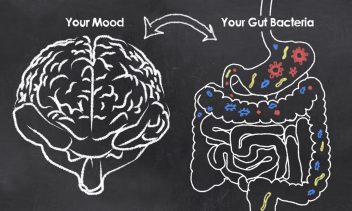How Food Impacts Mood- Part 2
Author: Dr. Megan Oliverio
Last year I wrote a blog touching on the ever increasing research being done in the field of nutritional psychiatry that is helping us understand the link between food and mood. It seems that with each passing year we are learning more about the benefits of healthy food and good nutrition. So why is it that we know what to eat, but it can continue to be challenging to change our diets?
Research tell us that our food choices can affect our mood, but did you know your mood can affect your food choices? If you are experiencing symptoms of depression and anxiety like low mood, irritability, lack of motivation and low energy levels, it may be difficult to find the energy and motivation to make healthy food choices. You are more likely to make decisions out of convenience or for familiar comfort foods, or you may find it difficult to eat anything at all. However, these decisions are likely contributing to our symptoms of depression and anxiety.
The Food & Mood Connection

The connection between diet and emotions stems from the close relationship between your brain and your gastrointestinal (GI) tract. Your GI tract is home to billions of bacteria that influence the production of neurotransmitters – chemical substances that constantly carry messages from the gut to the brain. Dopamine and serotonin are two common examples. Food rich in vitamins and nutrients promotes the growth of “good” bacteria, which in turn positively affects neurotransmitter production. When neurotransmitter production is in good shape, your brain receives these positive messages loud and clear, and your emotions reflect it. A steady diet of processed and refined foods, on the other hand, can cause inflammation that hampers production. Low-quality foods, those that are heavily processed and refined, are not the best choice for our brains and bodies. Because they are low in fiber and digested quickly, processed and refined foods can cause swings in blood sugar levels. These fluctuations in blood sugar can be harmful to overall brain health and affect mood.
Why It’s So Difficult
It’s important to understand our brain and body from an evolutionary standpoint. For our primitive ancestors, sugary foods were an excellent source of energy, so to maximize our survival as a species we evolved to find sweet foods particularly pleasurable. When we eat sweet foods the brain’s reward system – called the mesolimbic dopamine system – gets activated. Dopamine is a brain chemical released by neurons and can signal that an event was positive and pleasurable. When the reward system fires, it reinforces behaviors – making it more likely for us to carry out these actions again. Dopamine “hits” from eating sugar promote rapid learning, driving us to prefer and find more of these foods. Today, our environment is abundant with sweet, energy rich foods. We no longer have to forage for these special sugary foods – they are available everywhere. Unfortunately, our brain is still functionally very similar to our ancestors, and it really likes sugar. So what happens in the brain when we excessively consume sugar?

Sugar, in particular, is considered a major culprit of inflammation and it feeds “bad” bacteria in the GI tract. Ironically, it causes a temporary spike in “feel good” neurotransmitters, like dopamine. While it feels good momentarily, the feeling is fleeting, and is followed shortly thereafter by a crash that is terrible for your mood.
Our brain continuously changes and rewires itself through a process called neuroplasticity. This rewiring can happen within the reward system. Repeated activation of the reward pathway by drugs or by eating lots of sugary foods causes the brain to adapt to frequent stimulation, leading to a tolerance of sorts. That’s why it’s so hard to change our habits, but the good news is that changing back is very much possible. When you stick to a diet of healthy food, you’re setting yourself up for fewer mood fluctuations, an overall happier outlook, and an improved ability to focus.
Foods To Minimize
- Sugar – sugary drinks; soda; candy
- Refined Carbohydrates – sugars; highly processed grains; breakfast cereals
- Foods High in Trans Fats – fast food; non-dairy creamer; vegetable shortening
- Highly Processed Foods – packaged or frozen foods that tend to be high in sugar, added fats, and salt. Always check the label!
- Aspartame – found in diet soda and sugar free items
- Alcohol
Ways To Build Healthier Nutrition Habits
Fortunately, a healthy diet that is good for your overall health can also help to prevent symptoms of depression and anxiety. When you are feeling well, you may find it easier to stick to a healthy diet, which will in turn help you to continue to feel well. The more you can support yourself and practice self-care as it relates to nutrition, the better you’ll feel!
- Practice Mindful Eating – When tempted to eat to fill an emotional need, try practicing mindful eating. This basically means slowing down, eliminating distractions, and savoring the experience of eating good food. Check out our previous blog about the benefits of mindful eating.
- Meal Prep – Preparing your food for the week can actually go a long way toward avoiding last minute unhealthy decisions such as running through a fast food drive-thru on your way home. Spend a little time cutting up fresh fruit and veggies and separating them into snack-sized portions. Keep nuts and other healthy snacks on hand. Prepare as much of your weekly meals ahead of time as possible, and when it’s time to have dinner you’ll be less likely to make unhealthy choices.
 Understand Balance – Creating balance in your diet is necessary. Make every effort to be intentional about the food you eat, but there is no need to be inflexible. Don’t allow yourself to feel overwhelmed or pressured. You will be more successful if you approach food with a healthy outlook as the means to fuel your life, not as a list of rules to follow and check off.
Understand Balance – Creating balance in your diet is necessary. Make every effort to be intentional about the food you eat, but there is no need to be inflexible. Don’t allow yourself to feel overwhelmed or pressured. You will be more successful if you approach food with a healthy outlook as the means to fuel your life, not as a list of rules to follow and check off.
If you are interested in learning more about how food impacts your mood, additional ways you can improve your relationship with food, or are in need of support around building healthier habits, give us a call today!






